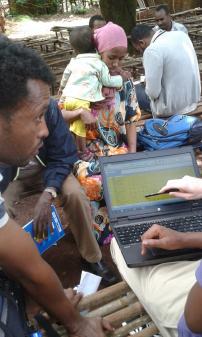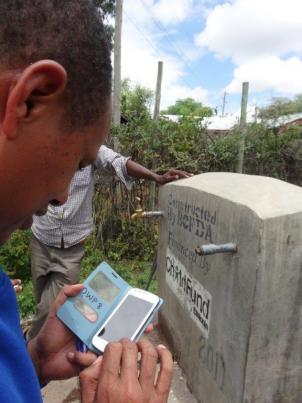Published on: 26/05/2016
 This blog was originally published on 22 June 2015
This blog was originally published on 22 June 2015
The excitement is needed because data is a corner stone for improving water, sanitation and hygiene (WASH) service delivery. But the expectations in particular on what ICT can do are unrealistic and build on doubtful assumptions. Before investing in national sector monitoring systems we suggest considering a set of principles. The principles came out of the lessons IRC staff learned in supporting the design and implementation of national sector monitoring systems in a variety of countries.
Principles
- Every national sector monitoring system should build on past monitoring efforts and every national monitoring system should monitor the norms and standards for water and sanitation services as defined in national policies.
- Many sector professionals are seduced by the fast developments in ICT to build big and all-encompassing data management systems the results of which often are not used. Monitoring must be ‘fit for purpose’.
- Development of national sector monitoring systems should be gradual and step wise balancing the need for data at different levels and the available skills with the opportunities of ICT.
- Effective and sustainable monitoring systems should produce data without which people cannot do their jobs and cannot fulfil their responsibilities. Monitoring systems will be effective when accountability is clear and respected.
- Time and patience is needed to build effective monitoring systems. The Government of Uganda took 15 years to build its national sector monitoring system. It started with a very basic monitoring system which then was adapted over time to reflect lessons learned; to better serve the data needs at different levels; to integrate new technology options; to add targets; to define indicators more precisely; to improve data collection methods; etc.
- For sustainable monitoring systems incentives are needed to collect and use data in particular at local levels. An example of an incentive is when data collection and data use becomes a prerequisite for receiving grants from national level.
- There is a role for statistical offices to independently measure the impact of service delivery. In particular politicians need to have access to more independent data and if needed challenge provider data.
Monitoring must be 'fit for purpose'
- Every monitoring system needs a calendar for activities since the time lines and levels of data collection, of data validation and use are interconnected and depend on each other. Management Information System (MIS) units are best equipped to enforce such a calendar.
- Data collection helps sector professionals to build rapport with communities, get a proper understanding of problems and defaults and create ownership for problem solving. Data collection should as much as possible be done by local WASH sector professionals responsible for planning and implementation of WASH services.
- Data needs to be filed where data is needed. Not only on a large computer in the national ministry but also at local level where sector professionals need to take decisions. Filing helps sector professionals and executives to see trends and change over time.
- Trust in data quality and reliability is needed for well-functioning monitoring and management information systems. Trust must be organised and regulated.
- Sustainable monitoring systems need a range of skills. Not only for data collection, but in particular for data analysis and data reporting. Some of the skills will need to be vested in WASH sector professionals, but some of these skills need data management specialists.
- A well-performing monitoring system needs continuous piloting. Technology changes fast, WASH governance changes fast, data requirements will change fast. Even a well-functioning and sustainable monitoring system will need space for experimentation and testing.

- A well-performing monitoring system needs continuous training facilities.
- Timely reporting and reliability of data quality is more important than size of data systems. Better have few indicators reported timely and with quality than having a great amount of data reported irregularly and with doubtful quality.
- Buying, using or leasing ICT for monitoring needs business minded approaches such as good contracts that give the client access to all data and source codes; help desk functions; regular updates and upgrades of ICT; regular assessment of ongoing contracts; clear procurement rules etc.
- The WASH sector is an integrated sector. Most of the time WASH is spread over different ministries: water, health, education, environment, housing and more. Data collection is therefore also spread over different ministries. WASH monitoring systems should draw on these systems and consolidate data in a WASH sector report.
- Monitoring systems reveal problems and constraints. Governments and other stakeholders need to have the skills and the resources to correct, repair, rehabilitate, re-train, re-raise awareness etc.? If there is no provision for action than monitoring will only frustrate and lose its momentum.
- Different monitoring systems are needed and could and should live in parallel and in interaction. Private operators will need other data than government ministries; development partners need other data than governments; civil society needs other data than DPs. The best monitoring environment is where monitoring is done by different stakeholders and where they use data to discuss, challenge and negotiate.

- There always is a political element in monitoring and a bias towards the interests of the ones managing the data. That is why parallel monitoring systems serving the interests of different stakeholders is a good thing. Contestation over the truth is a sign of a mature sector in which all stakeholders have a right to speak, respect each other’s opinions and dispute each other’s data.
The WASH sector is an integrated sector. Most of the time WASH is spread over different ministries: water, health, education, environment, housing and more. Data collection is therefore also spread over different ministries. WASH monitoring systems should draw on these systems and consolidate data in a WASH sector report.
 This blog was originally published on 22 June 2015
This blog was originally published on 22 June 2015
